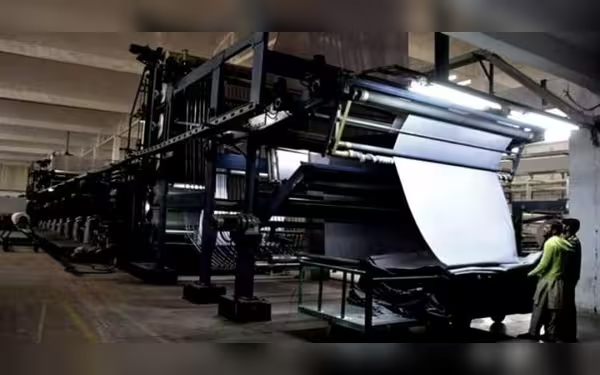Thursday, July 4, 2024 06:25 PM
APTMA Calls for Policy Changes in Textile Industry
- Reducing power tariffs to 9 cents/kWh to stimulate exports
- Lowering interest rate to 12 percent for economic growth
- Reinstating zero rating for textile sector to boost production
 Image Credits: urdupoint
Image Credits: urdupointThe All Pakistan Textile Mills Association (APTMA) urges key policy changes to support the textile industry's expansion in Pakistan. Proposed measures include reducing power tariffs, lowering interest rates, and reinstating zero rating to enhance exports and job creation.
The textile industry in Pakistan is a vital sector contributing significantly to the national economy. Asif Inam, the Central Chairman of the All Pakistan Textile Mills Association (APTMA), has urged for key policy changes to support the industry's expansion and enhance its economic impact.
Inam emphasized the necessity of reducing power tariffs to 9 cents/kWh, lowering the interest rate to 12 percent, and reinstating zero rating for the textile sector. These proposed measures aim to stimulate exports, attract investments, and create more job opportunities within the industry.
During a recent press conference at the APTMA office, Inam highlighted the financial challenges faced by the industry, including significant cross subsidies and stranded costs amounting to billions of rupees. He projected that a reduction in electricity costs could lead to increased grid demand and generate substantial revenue for the sector.
Furthermore, Inam pointed out the disparity between the current interest rate of 22 percent and the country's inflation rate of 11.8 percent. He suggested that a lower interest rate could result in considerable savings for both the government and the economy as a whole.
Chairman (North) Kamran Arshad emphasized the importance of reinstating the zero rating regime for all manufacturing stages of the textile value chain. This move, he argued, would help stimulate production, boost exports, and improve tax collection from the sector.
Senior Vice Chairman Asad Shafi highlighted the adverse effects of high energy tariffs on export-oriented firms. While competitive tariffs in recent years led to growth in textile and apparel exports, the current power costs have become burdensome, making production unsustainable compared to regional competitors.
The APTMA's call for policy changes underscores the industry's need for support to remain competitive and drive economic growth. Implementing these proposed measures could lead to a more vibrant textile sector, increased exports, and enhanced job creation, ultimately benefiting the national economy as a whole.













